Guide agents with scripts
Applies to: Dynamics 365 Contact Center—standalone and Dynamics 365 Customer Service only
In the customer service industry, agents need to deal with continuous updates both to products and processes. Even after agents have been rigorously trained, recurrent human errors and delays in service delivery occur due to a lack of guidance in real-time customer scenarios. These issues lead to lower productivity and thus negatively affect customer satisfaction levels. To avoid errors and ensure that processes are adhered to, agents need guidance.
Agent scripts provide guidance to agents about what to do when they get a customer issue. The scripts ensure that only accurate, company-endorsed information is being shared, while also safeguarding the organization in regard to issues of legal compliance. Agent scripts help organizations to be unified, accurate, and effective while also being faster and more efficient in terms of customer handling.
Agent scripts reduce the human errors involved, because agents know which actions they need to perform next while they interact with a customer, enabling agents to adhere to the business process. This, in turn, leads agents to provide quick resolutions for the issue (low average handling time) and improve customer satisfaction.
Value propositions
- Minimization of human errors
- Adherence to business processes
- Lower average handling time
- Improved customer satisfaction
Prerequisites
Make sure that you have the Productivity tools administrator security role. To learn more, see Assign roles and enable users.
Make sure that agents and supervisors are assigned the Productivity tools user security role. To learn more, see Assign roles and enable users.
Create agent scripts
Create agent scripts in the admin center by following these steps:
- In the Customer Service admin center site map, select Productivity in Agent experience.
- On the Productivity page, select Manage for Agent scripts.
- On the Agent scripts page, select New.
The following procedure is an example of an agent script for a chat session. You can modify the procedure for other types of sessions your agents are likely to come across.
On the New Agent script page, specify the following:
Field Description Value Name A name for the agent script. Chat session script Unique Name A unique identifier in the <prefix>_<name> format.
Important: The following are required for the unique name:- The prefix can only be alphanumeric and its length must be between 3 to 8 characters.
- An underscore must be there between the prefix and name.
Contoso_script Language A language from the list. The languages that are enabled in Microsoft Dataverse appear in the list. English Description Description for the agent script. This agent script is used for chat sessions. Select Save. The Agent script steps appears.
In the Agent script steps section, select New Agent script step. Quick Create: Agent script step appears.
Specify the following fields in the quick-create form.
Field Description Example Value Name Provide a name for the agent script step; this appears for the agent at runtime. You can use slugs for specifying the name of the step. To learn more, see Slugs. Example 1: Greet the customer.
Example 2: Hi {customer}Unique Name A unique identifier in the <prefix>_<name> format.
Important: The following are required for the unique name:- The prefix can only be alphanumeric and its length must be between 3 to 8 characters.
- An underscore must be there between the prefix and name.
Greet_script Owner By default, the signed in user is displayed as the owner. Clay Roddy Agent script The agent script for which the script step is being created. Chat session script Order Specify the order number based on which step is displayed to the agent. 1 Action Type Select an action type from the list: - Text instruction
- Macro
- Script
Description Describe the step briefly for your reference. This step opens a draft email to send the customer links to knowledge articles.
Note:
This field appears only when you select the Action Type value as Target Macro or Target script.Text instruction Specify the text instructions the agent needs to follow and execute. This is a text field. Additionally, you can pass parameter values by using the slugs and OData queries. More information: Pass parameter values
Note:
This field appears only if you select the Text value for the Action Type field.Greet the customer with the welcome message from the quick reply repository. Target macro Type the name of the configured macro in the text box, and then select the macro from the lookup results.
Note:
This field appears only if you select the Macro value for the Action Type field.Email Target script Type the name of the configured script in the text box, and then select the script from the lookup results.
Note:
This field appears only if you select the Script value for the Action Type field.Close the session Select Save and Close to add, save, and close the quick-create form.
Select Save to save the changes.
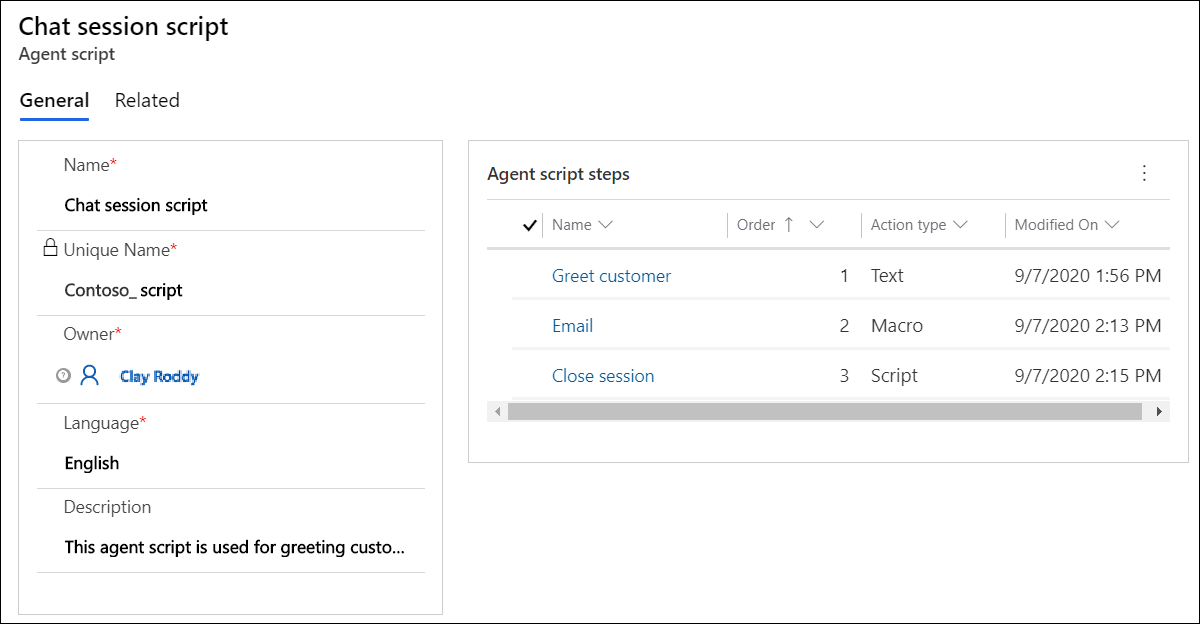
The agent script is now configured.
Associate an agent script with a session template
After you configure the agent script and add the field to a form, you need to associate the agent script with a session template so that the agent script will load for agents based on the type of session they've opened.
In the site map of the admin app, select Session templates in Workspaces.
Select a template from the list for which you want to associate the template. For example, select the Chat - Default Session template.
Select the Agent scripts tab.
In the Agent scripts section, select Add Existing Agent script. The Lookup Records pane appears.
In the Look for Records box, select the search icon. Select the agent script from the list, and then select Add.
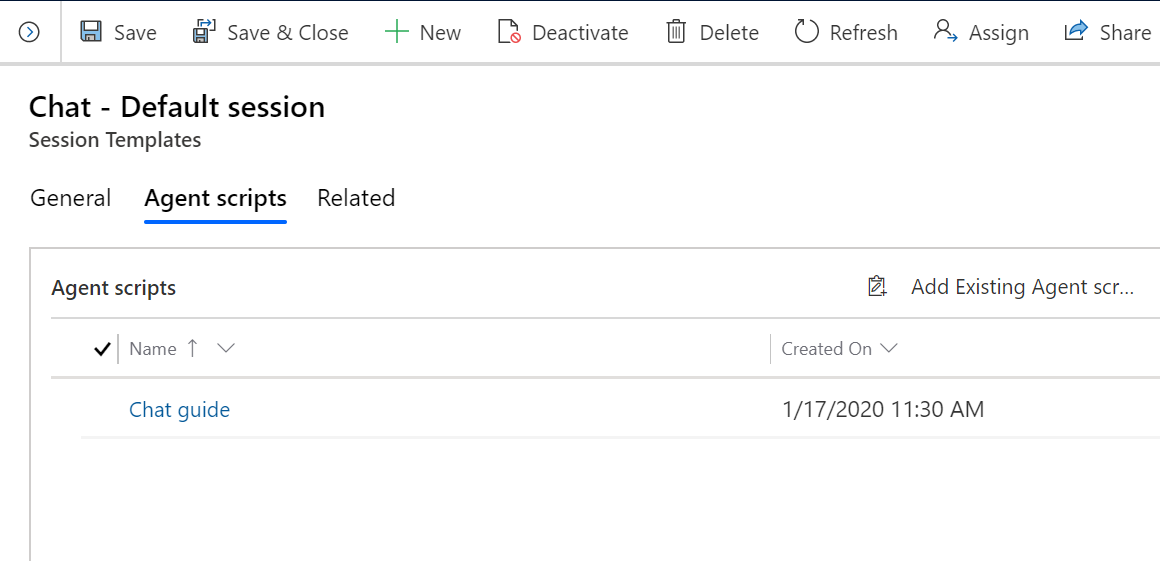
Select Save.
The agent script is associated with the session template.
Set the default agent script for agents
As an administrator, you can set different default agent scripts for agents who handle different services, customers, or products. You need a way to show these agents a script that's appropriate for the context of the conversation between them and the customer. With the agent script expression builder, you can define the conditions that define which script an agent is shown by default in the agent app.
Based on these conditions, when an agent accepts an incoming conversation, the agent script control selects a script from the different scripts that were made available for that particular session type and shows the script to the agent. In addition, agents can manually select a script from the list of available agent scripts if they need to switch between different scripts.
Enable and build the expression
You can build the expression in the Agent scripts tab in the sessions template.
In the site map, select Session templates in Workspaces.
Go to the Agent scripts tab.
Set the Enable build expression toggle to Yes, and then select Build Expression to define the expression. The Expression builder page is displayed.
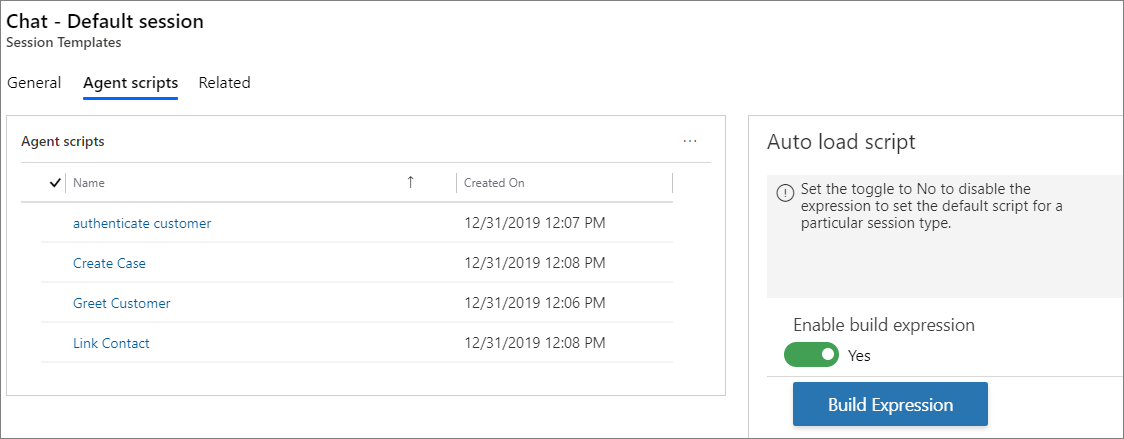
Select the Condition step, and then create the condition.
In the If true step, select Add an action. The Condition step is displayed. To learn about conditions, see Use the automation dictionary to pass context data parameters.
Select the Customer Service tab, and then select Set default agent script.
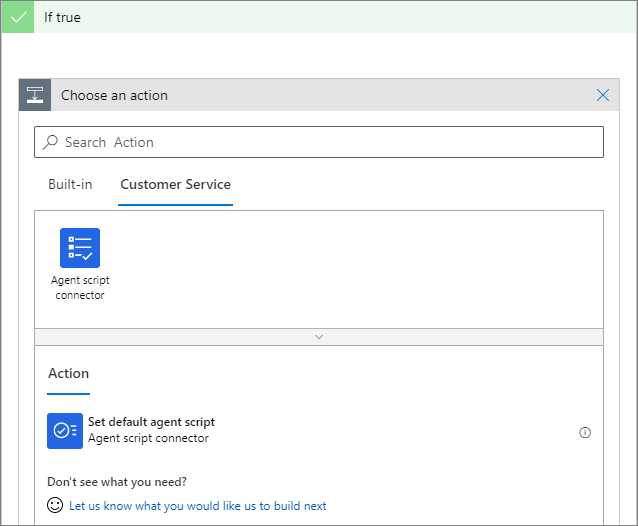
Select a script from the Agent script list.
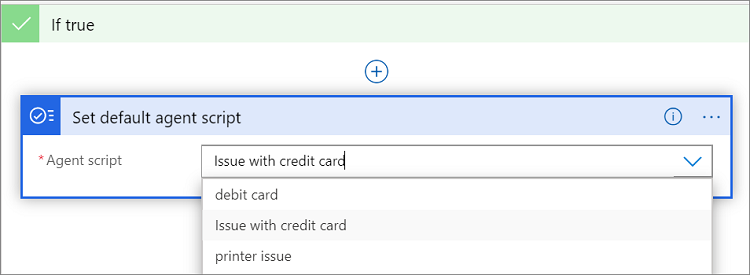
Follow steps 4 through 7 for the If false step.
Select Save and close to save the expression and close the builder.
Now, you've built the expression.
Use the automation dictionary to pass context data parameters
As an administrator, you need to configure the condition by using the automation dictionary based on the evaluation of the condition. A script is set as default, and this script is displayed to the agent at runtime.
The automation dictionary provides you certain data parameter keys that you can use to build your condition. These parameter keys are resolved and replaced by contextual values at runtime.
To learn about the slugs for productivity tools, see Slugs.
To learn more, see Use the automation dictionary to pass data parameter keys.